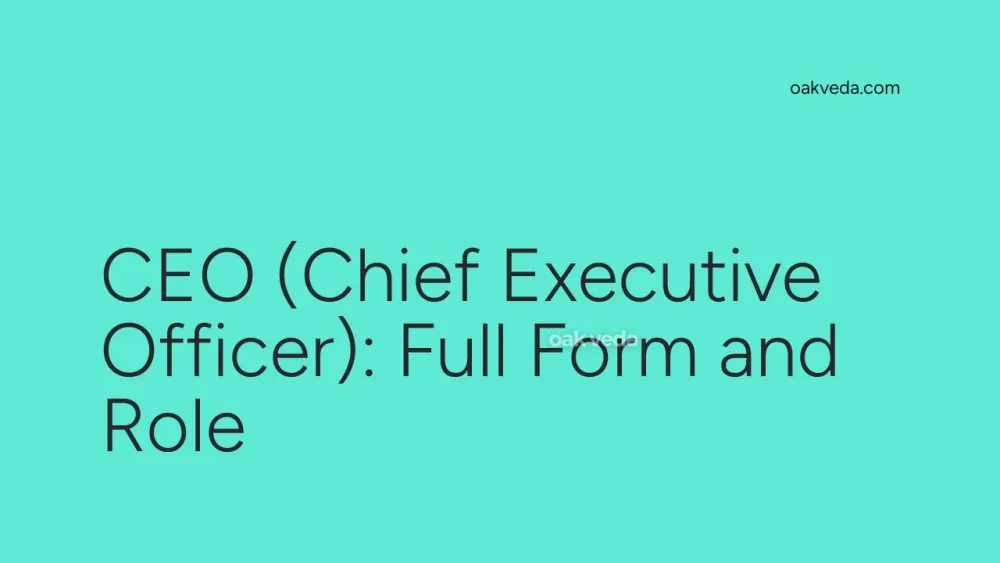
What is the Full Form of CEO?
The full form of CEO is Chief Executive Officer. This title represents the highest-ranking executive position within an organization, responsible for making critical decisions, setting strategic direction, and overseeing the company's overall operations.
What is a Chief Executive Officer?
A Chief Executive Officer (CEO) is the top executive in a company or organization, holding ultimate responsibility for its success or failure. They are the primary point of contact between the board of directors and the company's operations, translating the board's vision into actionable strategies and goals.
Origin and Development of the CEO Role
The concept of a CEO has evolved significantly over time. While the role of a business leader has existed for centuries, the specific title "Chief Executive Officer" gained prominence in the mid-20th century. As businesses grew more complex and corporate structures evolved, the need for a central figure to guide the organization became increasingly important.
How does a CEO work?
A CEO typically works closely with other C-suite executives, such as the Chief Financial Officer (CFO) and Chief Operating Officer (COO), to manage various aspects of the business. They are responsible for:
- Setting the company's vision and strategy
- Making high-level decisions
- Managing the company's resources
- Communicating with stakeholders
- Representing the company to the public and investors
Types of CEOs
While the core responsibilities remain similar, there are different types of CEOs based on their approach and the nature of their organization:
- Founder CEOs: Entrepreneurs who start and lead their own companies
- Professional CEOs: Experienced executives hired to lead established companies
- Interim CEOs: Temporary leaders appointed during transitions or crises
- Non-profit CEOs: Leaders of charitable or social organizations
Functions of a CEO
The primary functions of a CEO include:
- Strategic Planning: Developing long-term goals and strategies for the organization
- Leadership: Inspiring and guiding employees towards achieving company objectives
- Decision Making: Making critical choices that impact the entire organization
- Resource Allocation: Ensuring optimal use of the company's financial and human resources
- Stakeholder Management: Maintaining relationships with shareholders, board members, and other key stakeholders
Applications of CEO Leadership
CEO leadership is crucial in various scenarios:
- Organizational Transformation: Guiding companies through major changes or restructuring
- Crisis Management: Navigating challenges such as economic downturns or public relations issues
- Innovation: Fostering a culture of creativity and technological advancement
- Global Expansion: Leading companies into new markets and international growth
Features of an Effective CEO
Successful CEOs often exhibit the following characteristics:
- Visionary Thinking: Ability to see the big picture and plan for the future
- Strong Communication Skills: Effectively conveying ideas to diverse audiences
- Adaptability: Flexibility in the face of changing market conditions
- Ethical Leadership: Maintaining high standards of integrity and corporate responsibility
- Decision-Making Prowess: Making tough choices under pressure
Benefits of Strong CEO Leadership
Effective CEO leadership can lead to numerous benefits for an organization:
- Improved financial performance
- Enhanced company culture and employee morale
- Increased innovation and competitiveness
- Better risk management and crisis handling
- Stronger brand reputation and stakeholder trust
Limitations or Challenges of the CEO Role
Despite its prestige, the CEO position comes with significant challenges:
- High Pressure: The responsibility for the entire organization's performance
- Work-Life Balance: Long hours and constant demands on time and energy
- Public Scrutiny: Increased visibility and accountability for company actions
- Rapid Change: Keeping up with evolving technologies and market trends
- Stakeholder Management: Balancing the interests of various groups (shareholders, employees, customers)
Future Developments in CEO Responsibilities
As the business landscape evolves, so too will the role of the CEO. Future trends may include:
- Increased Focus on Sustainability: CEOs will need to prioritize environmental and social responsibility
- Digital Transformation: Leading companies through technological disruptions and digital innovations
- Remote Leadership: Adapting to managing distributed workforces and virtual teams
- Ethical AI Implementation: Navigating the challenges and opportunities of artificial intelligence
- Global Complexity: Managing increasingly complex international operations and regulations
FAQs on CEO Full Form
-
What qualifications are needed to become a CEO? While there's no set educational path, many CEOs have advanced degrees in business, law, or specific industry-related fields. Experience, leadership skills, and a track record of success are often more important than formal qualifications.
-
How is a CEO different from a company's owner? An owner has equity in the company but may not be involved in day-to-day operations. A CEO, whether they own equity or not, is responsible for managing the company's operations and answering to the board of directors.
-
Can a company have multiple CEOs? While uncommon, some companies do have co-CEOs who share responsibilities. This structure can be challenging and requires clear division of duties and excellent communication.
-
What is the average tenure of a CEO? CEO tenure varies widely, but studies suggest the average is around 5-7 years. However, this can differ significantly based on company performance and industry norms.
-
How do CEOs impact company culture? CEOs play a crucial role in shaping company culture through their leadership style, decision-making processes, and the values they emphasize and demonstrate in their actions.
In conclusion, the full form of CEO - Chief Executive Officer - represents a critical role in modern organizations. As the highest-ranking executive, a CEO's leadership, vision, and decision-making capabilities can significantly influence a company's success, culture, and long-term sustainability.
You may be interested in:
- PWD (Public Works Department): Full Form and Functions
- ADCB (Abu Dhabi Commercial Bank): Full Form Explained
- ESIC (Employees' State Insurance Corporation)
- PSU (Public Sector Undertaking): Full Form Explained
- B.Com (Bachelor of Commerce): Full Form and Guide
- AMC (Annual Maintenance Contract): Full Form Explained

